Tehran files charges against prominent critic after his comments on Palestinians
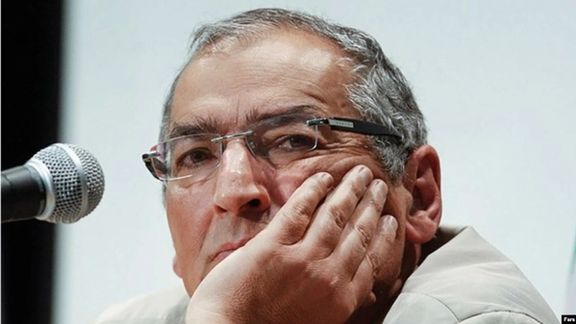
Tehran's Prosecutor's Office has filed charges against political commentator Sadegh Zibakalam following a speech he delivered in Doha which has enraged the government.

Tehran's Prosecutor's Office has filed charges against political commentator Sadegh Zibakalam following a speech he delivered in Doha which has enraged the government.
"Due to recent baseless statements made by Sadegh Zibakalam, the Tehran Prosecutor's Office has filed charges against him," Mizan, Iran's judiciary news website, said on Tuesday, without providing further details of the charges.
The charges come after a video of his lecture, titled “The Trump presidency and the 46 years of hostility between Iran and the US,” was widely shared on social media.
"More than being worried about Trump and what Trump is going to do with Iran, I am worried about the situation in Iran – the sharp contradiction, the sharp conflict between the younger generation of Iranians and their hatred of literally anything which is tied to the Islamic Republic,” Zibakalam said in a lecture at the Arab Center for Research and Policy Studies in Doha on US President Trump's inauguration on January 20.
Zibakalam also said that Iran's youth hate Palestinians because the Islamic Republic's leaders support them. "You'll be surprised how many Iranians hate Palestinians," he said, the sympathy now eroded in the wake of October 7.
Instead, he said the young generation see Israeli Prime Minister Benjamin Netanyahu, as a "hero" after the war which has seen Tehran's regional allies Hamas and Hezbollah significantly weakened.
Mizan said that Zibakalam, who is currently on medical leave outside of prison, faces multiple cases for "making false statements in the media and on social media."
He was sentenced to 18 months in prison and a two-year ban from political activities for "propaganda against the system."
In a second case, he received a one-year sentence for publishing "false material," and in a third, he was sentenced to six months in prison for "spreading false information." The Supreme Court upheld his sentences, Mizan reported.
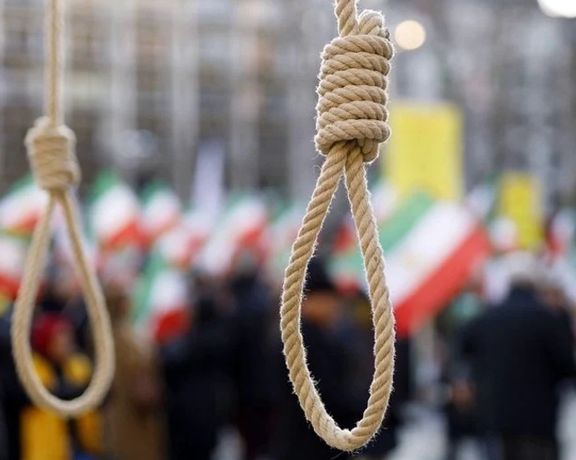
The year 2025 began with festive fireworks and colorful lights around the globe. In Iran, it was marked by the execution of at least 19 individuals across the country, according to Iran Human Rights (IHR NGO).
Within two weeks, the number rose to at least 46—that is one life taken every 8 hours. Human rights groups believe the real toll is even higher.
It was clear that the Islamic Republic had no intention of slowing down after it executed more than 900 in 2024, a record since 2015, as reported by the United Nations human rights office.
On January 30, 2024, a Tuesday, political prisoners in the women’s ward of Tehran’s Evin prison announced that they would go on hunger strike every Tuesday to protest the rising executions, and in solidarity with ten others who had done so in Ghezel Hesar prison.
The move was triggered by the execution of Mohammad Qobadlou and Farhad Salimi just a week prior. A new campaign was born: No to Execution Tuesdays. Nobel Peace Prize laureate Narges Mohammadi backed the move on Instagram.
In the one year since that Tuesday, hundreds of political prisoners from over 30 prisons have joined the campaign, refusing to eat or drink on Tuesday. They accuse the Islamic Republic of weaponizing the death penalty to silence dissent.
Their demand? The abolition of what they call "state-sponsored premeditated murder”.
“This is the first time prisoners from diverse political backgrounds have united to consistently protest executions,” Mahmood Amiry-Moghaddam, Director of IHR NGO told Iran International, hailing the campaign as a “milestone” in Iran’s fight against the death penalty and calling on Iranian civil society to join the campaign and express opposition to executions every Tuesday.
The long death row
At least 54 political prisoners are currently on death row in Iran, according to the Human Rights Activists News Agency (HRANA), with 19 having their convictions upheld by higher courts of the Islamic Republic.
One is Pakhshan Azizi, a Kurdish-Iranian human rights activist and social worker, who has been sentenced to death for "armed rebellion against the state." Amnesty International has condemned her sentence, calling it another example of a broader pattern targeting minorities and activists.
Leading in capital punishments
The Islamic Republic of Iran carries out three-quarters of all executions globally—outside China, which classifies capital punishment numbers as state secret, according to Amnesty International. It’s worth noting that Iran holds around 1 percent of the world’s population.
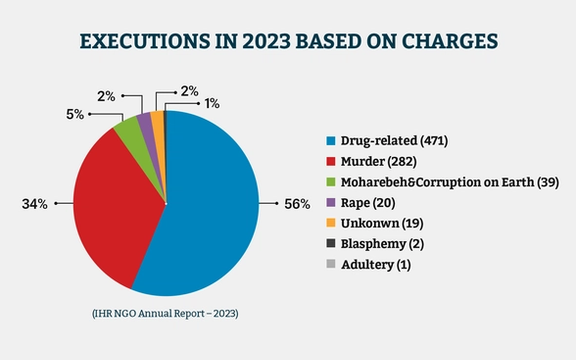
In 2024, a total of 31 women were executed in Iran, the highest annual number in 17 years. Many were convicted of murder in cases stemming from domestic violence or forced marriage. Iran also leads in executions of ethnic minorities, who often face systemic discrimination and lack access to fair trials.
Executions for drug-related offenses have surged since 2020, reversing a brief decline following the 2017 Amendment to the Anti-Narcotics Law. IHR NGO reported that drug-related executions in 2023 were 18 times higher than the annual average between 2018 and 2020. Ethnic minorities disproportionately bear the brunt of these executions.
In December 2024, political prisoner Ahmadreza Haeri issued a chilling warning from Ghezel Hesar prison about an impending "massacre" of drug offenders.
“Prosecutors in Tehran’s surrounding areas have decided to execute ALL drug offenders with final death sentences before Norouz [Iranian New Year, March 21],” Haeri warned, highlighting that the prison holds three times its official capacity.
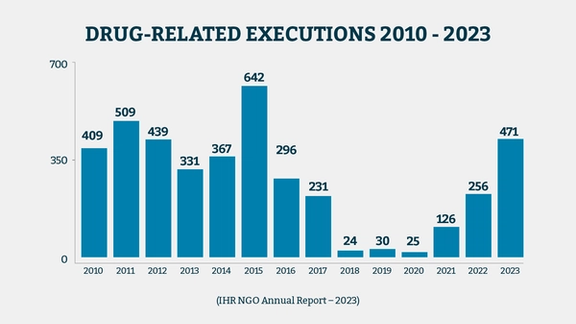
Road ahead: collective responsibility
The campaign No to Execution Tuesdays represents an act of resistance by political prisoners and a step in the long march to the abolition of the death penalty in Iran.
But stopping, even slowing, Tehran’s execution machine requires an urgent and unified response from various players, according to Amiry-Moghadam.
Political advocacy, public awareness campaigns, and targeted sanctions on judicial officials could all be part of a collective effort to challenge the Islamic Republic on its continued executions.
Iranian political prisoners have sparked a movement of hope and defiance. But ending the death penalty in Iran is a tall order that those involved in the campaign say requires sustained efforts at every level—domestic, regional, and international.
Whether or not they can attract the widespread solidarity they seek remains to be seen.
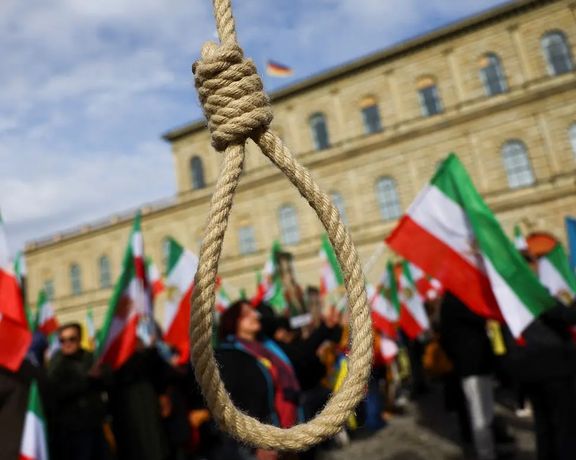
The United States for the first time ever spared Iran criticism for its human rights record at the 48th Session of the Universal Periodic Review (UPR) of the United Nations Human Rights Council (UNHRC) in Geneva on Friday.
It is an unprecedented move that is considered significant by human rights advocates, saying this could show disregard for Iran's human rights violations.
The UPR is an essential mechanism of the council aimed at improving the human rights situation for member states. Iran is one of 14 states reviewed by the UPR working group.
Based on log records, the United States has filed recommendations on the Islamic Republic since 2010, expect for this year.
Iran did face criticism this year from other member states including the United Kingdom, Sweden, Switzerland and Paraguay, denouncing the country’s treatment of women, its high rate of executions and crackdown on dissidents.
Ukraine took aim at Iran for supplying Russia’s war in Ukraine with drones and missiles. Germany condemned Tehran for committing gender discrimination and suppressing basic freedoms, urging the government to put an end to the death penalty.
Why the UPR matters
Human rights activists use the UPR to advocate for change and expose Iran’s human rights abuses on an international platform. The withdrawal of the United States from making recommendations is a blow to human rights advocacy, Nazanin Afshin-Jam an Iranian-Canadian activist told Iran International.
“I am shocked and devastated by this news,” said Afshin-Jam “We rely on Western liberal democracies, especially countries like the United States that champion human rights and freedoms, to act as moral compasses in holding regimes accountable."
Afshin-Jam, the founder of the Iranian Justice Collective (IJC), used to run an organization called Stop Child Executions, which focused on ending the execution of juveniles around the world. Part of their work included submitting findings to the UPR process, a critical tool for exposing human rights violations.
"The idea of the U.S. not submitting its findings on the Islamic Republic of Iran’s blatant and egregious human rights abuses is unprecedented. This is not the moment to pull back; it’s the moment to push forward and ensure accountability," she said.
Iran International has reached to the US State Department for a response and did not hear back in time for this report.
"Not a good sign"
Taimoor Aliassi , the UN representative of Kurdistan Human Rights Association in Geneva, told Iran Interantional he feels deceived by the US, which is breaking from its long-standing tradition of championing human rights.
“This is not a good sign for human rights,” said Aliassi, “The situation of human rights and minority rights is worsening in Iran. There’s a dramatic increase in the number of executions. It is really important for the United States to take this into consideration if they really want to deal with Iran and to make improvements or if they really intend to support the Iranian people.”
Prior to the UPR meeting in Geneva, Shadi Amin, the Director of 6rang, an Iranian Lesbian and Transgender network, lobbied member states to advocate for Iran’s LGBTQ community.
Nine member states urged Iran to not criminalize homosexuality, which is considered a crime punishable by death in Iran, but the United States, according to Amin is not a country Iranians should rely on anymore.
“The Iranian human rights community should try not to count on the US government in the future. The grassroots communities need to stand up and do something, because that's not acceptable what they [the US administration] are doing,” said Amin.
Iran’s delegation, led by Deputy Minister for International and Legal Affairs at the Ministry of Foreign Affairs Kazem Gharibabadi, took to the podium Friday, saying that significant progress had been made to improve the lives of Iranians. Gharibabadi also referred to any criticism as politically motivated.
In 2024, The United Nations Fact Finding Mission said it uncovered murders, torture and rape, accusing Iran of committing crimes against humanity.
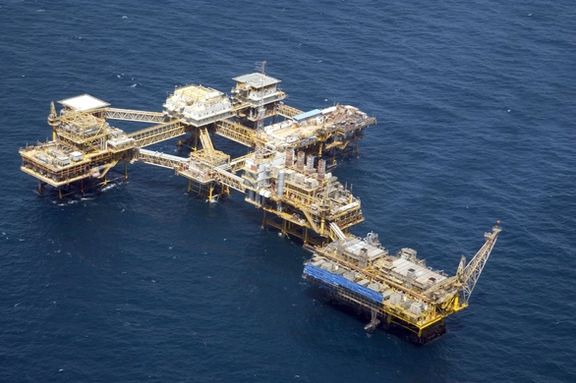
The 2001 gas supply agreement between the National Iranian Oil Company (NIOC) and the UAE-based Crescent Gas Corporation (CGC) remains one of the most controversial topics in Iranian politics.
The agreement, signed during the administration of reformist President Mohammad Khatami, was never implemented.
Iran has been ordered to pay substantial damages to Crescent and has lost billions of dollars in potential revenue after gas exports under the deal, which were supposed to begin in 2008, failed to materialize.
The controversy primarily centers on allegations of corruption leveled by ultra-hardliners against former Oil Minister Bijan Zanganeh and other officials aligned with the so-called reformist faction, unfavorable rulings by international arbitration courts against NIOC, and the loss of substantial revenue from the Salman oil and gas field.
Q: What is the Crescent Deal?
The Crescent gas deal was a 25-year contract to export natural gas from Iran's offshore Salman field in the Persian Gulf to the United Arab Emirates.
Under the agreement, Iran was to deliver approximately 500 million cubic feet of natural gas per day to the UAE, starting in 2008.
Crescent Gas invested approximately $300 million in infrastructure, including a gas sweetening plant and transmission facilities, while NIOC spent over $1.5 billion developing the Salman gas field and its related transport infrastructure.
Negotiations with the UAE side over pricing terms continued after the government transitioned to populist President Mahmoud Ahmadinejad in 2005. These talks initially broke down due to Tehran's insistence that the previously agreed price was too low compared to rising global prices at the time.
The Ahmadinejad administration later dropped its opposition to the agreement and chose to implement it. However, under political pressure, NIOC ultimately refused to begin supplying gas to CGC as agreed.
Q: Who opposed the Crescent deal and why?
Saeed Jalili, ultra-hardline politician and secretary of Iran's Supreme National Security Council (SNSC) under then-President Ahmadinejad, is known as the staunchest critic of the Crescent Deal.
Former Oil Ministry official Mahmoud Khaghani claimed in July 2024 that in early 2010, Ahmadinejad urged the Supreme National Security Council to resolve the Crescent issue in order to avoid litigation.
Khaghani, accused Jalili of sabotaging the deal due to personal grudges against former Oil Minister Zanganeh, the architect of the deal, and insisted that the deal should never be implemented. According to Khaghani, Jalili argued that CGC would not be awarded more than $850 million in damages if the case went to court.
Proponents of the deal have also accused Jalili of attempting to create insurmountable obstacles in nuclear talks with world powers while he headed the nuclear negotiation team.
Currently a member of the Expediency Discernment Council (EDC), appointed by Supreme Leader Ali Khamenei, Jalili leads the faction within the EDC that opposes Iran's accession to the conventions of the global money laundering watchdog, the FATF.
Despite repeated challenges from Zanganeh to publicly debate the matter, Jalili has declined, stating that the issue is too complex for a debate and should instead be resolved in court.
Q: What legal steps has CGC taken against NIOC?
In 2009, Crescent Gas filed a lawsuit against NIOC with the Permanent Court of Arbitration (PCA) in The Hague. In 2014, the arbitration court ruled that NIOC had breached its contractual obligations.
In 2021, the arbitration tribunal awarded CGC $2.43 billion in damages for lost profits due to NIOC's failure to deliver gas. NIOC appealed the ruling to the Court of Appeal in London, but the appeal was rejected in July 2023.
As of January 2025, the award, including accrued interest, amounts to approximately $2.75 billion.
Separately, in September 2021, another tribunal awarded Dana Gas, an affiliate of Crescent Petroleum, $607.5 million for NIOC’s failure to supply gas under the same agreement. This award only covers the first 8.5 years of the 25-year contract.
Additional arbitration claims could raise the total damages sought from NIOC to as much as $18 billion.
Q: Has NIOC paid the sums awarded to the UAE side?
To date, NIOC has not fulfilled its payment obligations. However, Crescent Petroleum has successfully obtained orders to seize NIOC assets abroad in order to enforce the arbitration awards.
In April 2024, a UK court ordered the transfer of the NIOC House in London to CGC as partial settlement of the damages. More recently, another NIOC-owned building in Rotterdam, the Netherlands, was seized for the same purpose.
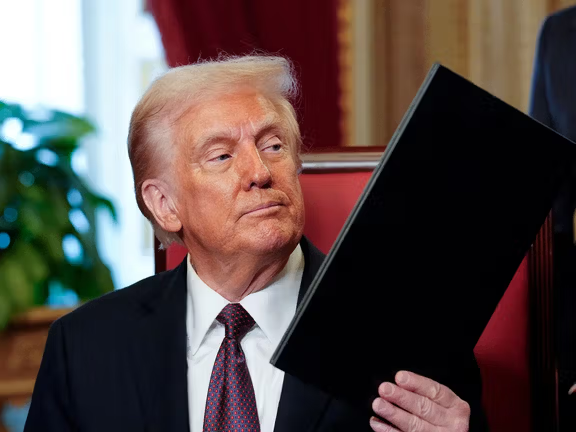
President Donald Trump’s decision to pause all US foreign aid has left human rights activists concerned about its impact on Iran-related programs, with some saying the order could help Tehran further restrict its people’s access to information.
Several Iranian human rights organizations, internet freedom programs and activists engaged in media and civil society work have received notices that their funds will be suspended for three months, Iran International has learned.
Trump signed an executive order on January 20, his first day in office, suspending foreign development assistance for 90 days to allow for a review of its efficiency and alignment with his America First policy stance.
Following the move, the State Department has halted most ongoing foreign aid programs and paused the initiation of new assistance, according to an internal memo distributed to officials and US embassies abroad.
Official government figures show Washington is the world's biggest donor of international aid, spending $39 billion in the 2024 fiscal year, out of which $65 million was allocated to funding State Department-administered Near East Regional Democracy (NERD).
The body is the main foreign assistance channel through which the United States has supported civil society and human rights in Iran since 2009, according to the Congressional Research Service.
“We have been told in writing that we must stop all work on the program and not incur any new costs after January 24th and cancel as many obligations as possible,” said one State Department grantee.
“It doesn’t look like anyone has given thought to the implications of this decision... The lack of clarity of the notice we received is just absurd. It is unclear how long this process will take,” the person added.
The State Department did not immediately respond to a request for comment.
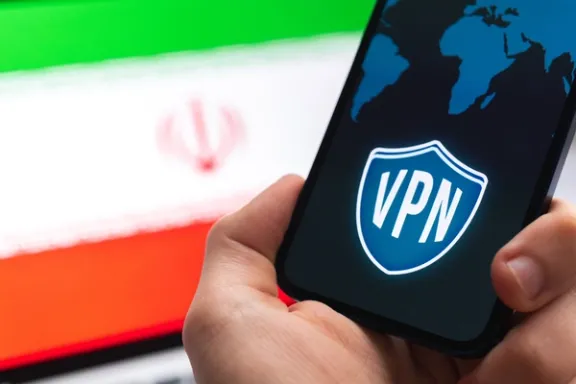
Supporting internet freedom
Among the grantees are Persian media outlets that publish uncensored news for Iranian citizens, as well as human rights organizations that document abuses in Iran, which is instrumental in keeping the Islamic Republic accountable.
A part of the US funds also covers the expenses of Virtual Private Network (VPN) services which ordinary Iranians used to circumvent the Islamic Republic’s censorship. Many of these services will have to stop their operation following the aid cut.
“It is a very dangerous move, because the issue of internet freedom is very vital, both to the people of Iran and the allies of Iranian people in the West,” a cyber security expert based in Silicon Valley told Iran International on condition of anonymity.
Trump’s order, an internet activist told Iran International, deprives 20 million Iranians, or a fifth of the population, of US-supported VPNs they use to bypass Tehran’s internet curbs.
At their peak during the “Woman Life Freedom” protests in 2022, VPN usage in Iran hit two-third of the population. “In today’s Iran, the internet has no meaning without VPNs,” writes internet activist Soroush Ahmadi in an article for Peace Line journal, which is published by the Virginia-based NGO “Human Rights Activists in Iran”.
The VPNs commercially available in the Iranian market are believed to be controlled by the Islamic Republic and even sold by entities affiliated with the Revolutionary Guards who profit from the needs of Iranians to gain unfettered access to the internet.
During Trump’s first term in office in 2020, US government-funded technology companies recorded an increase in the use of circumvention software in Iran after boosting efforts to help Iranian antigovernment protesters thwart internet censorship and use secure mobile messaging.
Since the 2018 protests in Iran, Washington had accelerated efforts to provide Iranians more options on how they communicate with each other and the outside world.
These included providing apps, servers and other technology to help people communicate, visit banned websites, install anti-tracking software and navigate data shutdowns, The Financial Times reported in 2020 citing a Trump administration state department official.
The second Trump administration also seemed to be pursuing the same approach toward the Iranian people before the inauguration.
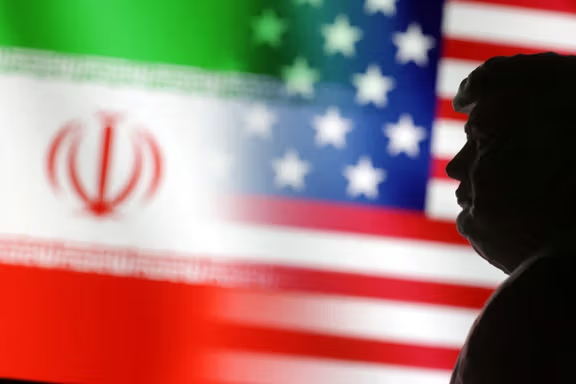
Maximum pressure on people or government?
Secretary of State Marco Rubio said in his Senate confirmation hearing earlier this month that “anything that we do with Iran needs to be clear eyed about who that regime is, but also who those people of Iran really are, because they're not their leaders.”
However, an internet expert told Iran International that the new decision “stands in contrast to the Trump administration’s stated position of supporting the Iranian people against the Islamic republic.”
“In reality, this policy will exert maximum pressure on the Iranian people rather than the government. It will trap Iranian citizens behind a digital wall and assist the government in building its national internet, effectively isolating the nation from the rest of the world,” the expert said.
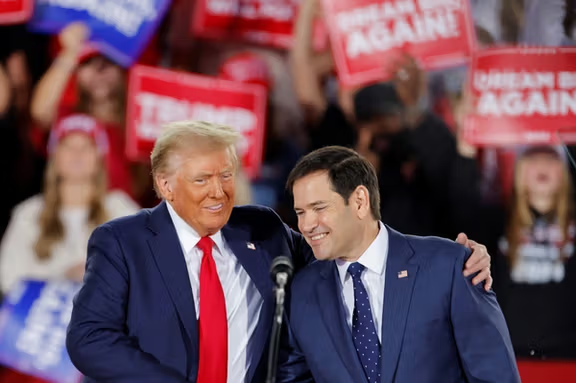
‘Worst form of punishment’
The Silicon Valley-based cyber security expert says the contradiction between Rubio’s words and the executive order “will raise serious questions in the minds of many Iranians, because this is the worst form of punishment for the people of Iran.”
“With the relentless censorship and oppression by the Islamic Republic, if the current form of support for internet freedom outside Iran disappears, it would in a way be the greatest gift from the Trump administration to the tyrants in Tehran,” the expert added.
“With a stroke of the pen, Trump’s executive order and Rubio’s memo implementing it have done what the Iranian regime could not do after spending billions of dollars on their national Internet: cut off the last channel to the global internet that Iranians had,” said the Iranian internet activist.
The decision not only undermines the free flow of information and access to free internet for Iranian people, it also “disrupts many civil society activities, including secure communication with one another, which strengthens civil society and is essential for safe organization,” according to Ahmad Ahmadian, head of California-based tech non-profit.
“Moreover, it allows the Iranian government to dominate the public narrative by silencing people's voices through cutting off their access to information tools and censored social media in Iran,” added Ahmadian whose company Holistic Resilience aims to advance internet freedom and privacy by developing and researching censorship circumvention.
Big Tech
Last September, the White House convened a meeting with representatives of Amazon, Alphabet's Google, Microsoft, Cloudflare and civil society activists in a bid to encourage US tech giants to offer more digital bandwidth for government-funded internet censorship evasion tools.
The tools, supported by the US-backed Open Technology Fund (OTF), have seen a surge of usage in Iran and other authoritarian states that heavily censor the internet, Reuters reported at the time.
However, Big Tech may not be willing or able to continue their support for providing anti-censorship tools without the US government’s funds.
“The leadership of the US government has been crucial in urging big tech companies to provide public services,” says Ahmadian. “Without the encouragement of the US government, these companies wouldn't take the initiative on their own.”
After the nationwide 2022 protests began in Iran, the Iranian government severely restricted internet access for its citizens.
In response to the restrictions, which included complete and periodic internet shutdowns and slowing down of internet speeds, the US government lifted some curbs on exporting internet services to Iran, allowing Elon Musk’s SpaceX to provide satellite internet services.
By the end of 2024, the number of Starlink satellite internet users in Iran surpassed 100,000, a senior industry official in Iran said earlier this month, underscoring the keenness of Iranians to defy curbs on their access to the outside world.
Impact on human rights projects
However, the consequences of Trump’s executive order will not remain limited to internet censorship circumvention tools, activists say.
The pause in US foreign aid, a human rights activist told Iran International, “(will) impose restrictions on projects that address human rights violations or investigate governmental and military corruption which have impacted Iran's economy and social conditions in favor of foreign terrorist activities and money laundering.”
"This decision by the Trump administration would be a reciprocal gift to the Islamic Republic and its corrupt officials, the Revolutionary Guard, and money-laundering networks in the West," the activist, speaking on condition of anonymity, added.
The activist said several non-Iranian American institutions have been using these funds to investigate corruption and money laundering by the Islamic Republic in environmental and construction sectors. “These organizations will be forced to halt their activities,” he added.
Several activists speaking to Iran International believe that if the projects related to promotion of human rights and internet freedom in Iran do not receive an exemption within the next month, they will either collapse entirely or be deeply curtailed.
“The impact of this freeze might not be immediately noticeable, but its severe implications will become evident over time,” a second human rights activist said.
Internet experts warned that even if US aid starts again in three months, the damage is irreversible since many people had migrated to vulnerable domestic VPNs and might never fully return to using US-backed secure services.
“This issue jeopardizes both the freedom of information and the security of individuals," said the Silicon Valley expert.
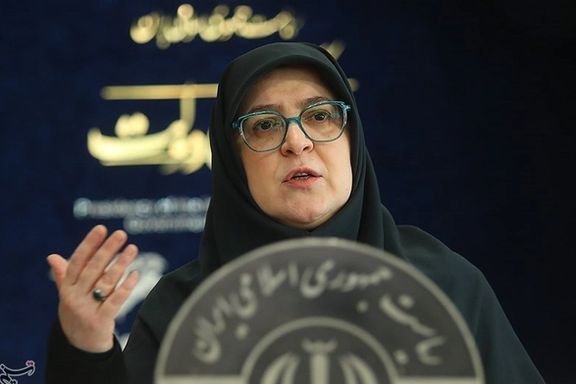
The Iranian government stressed that any decisions on potential nuclear talks would be made within the framework of the Supreme National Security Council, in a nod to the conservative establishment.
The remarks from the spokeswoman of the relatively moderate government appeared aimed at reassuring hardliners that any talks will be subject to strict oversight and not diverge from the priorities of Supreme Leader Ali Khamenei.
President Masoud Pezeshkian’s said earlier this month he was ready to engage in talks with the US administration of Donald Trump.
However, the move prompted questions within Iran about whether he had higher-level approval for such an initiative.
Government spokeswoman Fatemeh Mohajerani addressed domestic concerns, particularly from hardliners wary of negotiations with the West, emphasizing the established and controlled nature of the decision-making process.
"In important matters such as the nuclear issue, the matter is raised and reviewed in the Supreme National Security Council (SNSC), and the approvals of the council also specify what path must be followed for implementation," Mohajerani said in an interview with ILNA news agency on Sunday.
Mohajerani further urged against internal political disputes affecting foreign policy: "We should all be aware that foreign policy issues and national issues in general should not become an arena for factional and transnational disputes. We must proceed with consensus and agreement on foreign policy issues."
The SNSC is tasked by the Constitution to define national security and defense policies within the framework set by Khamenei.
The Supreme Leader appoints the SNSC secretary and holds final approval power over all SNSC decisions, placing him and the council at the center of Iran's foreign policy apparatus.
The SNSC formulates Iran's nuclear policy, subject to the Supreme Leader's ratification. The SNSC secretary also led nuclear negotiations until 2013, when the responsibility was assigned to the foreign ministry.
In recent weeks, several politicians and commentators in Iran have indicated that President Masoud Pezeshkian has received approval from the Supreme Leader and the Supreme National Security Council to initiate negotiations with the United States despite the two nations breaking ties in 1980.
However, none of the authorities have officially confirmed that they have authorized any such negotiations with the United States regarding Iran's nuclear program or other contentious issues.
Pezeshkian has tacitly conveyed Tehran's willingness to engage in talks with the US, but Khamenei’s hardline allies have strongly criticized both his remarks and those of other officials who advocate for talks.
Such discussions in Iran come as the International Atomic Energy Agency (IAEA) continues to express concerns about the level of access its inspectors have to Iranian nuclear facilities.
IAEA chief Rafael Grossi, speaking at the World Economic Forum in Davos last week, said, "We are not inspecting at the levels or at the places that we believe we should be inspecting.”
He also highlighted that Iran has accumulated approximately 200 kg of uranium enriched to up to 60% purity, a level dangerously close to weapons-grade.
While Grossi acknowledged the IAEA has no concrete evidence of a current Iranian nuclear weapons program, he reiterated that Tehran is not fully cooperating with the agency.
UN Secretary-General Antonio Guterres also addressed the issue at Davos, calling on Iran to definitively renounce nuclear weapons and improve relations with its regional adversaries and the United States.
"The most relevant question is Iran and relations between Iran, Israel and the United States," Guterres said. "Here my hope is that the Iranians understand that it is important to once and for all make it clear that they will renounce to have nuclear weapons, at the same time that they engage constructively with the other countries of the region."